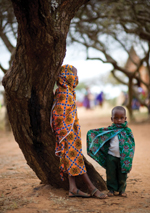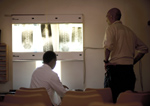|
|
|

|
Madaktari Africa Program engages MUSC specialities
|
By Dawn Brazell
Public Relations
The moment's crystal clear in Dilantha Ellegala's mind--the moment he
was hooked on global medical work.
 Tanzania has 5.2
health care workers for every 10,000 people, one of the lowest number
of physicians per persons in the world. Tanzania has 5.2
health care workers for every 10,000 people, one of the lowest number
of physicians per persons in the world.
The neurosurgeon had, through a series of coincidences, ended up in
Tanzania after finishing his medical training. He had spent six months
there training medical staff how to do basic neurosurgery. He went back
a few months later, and a young technician took his hand and led him to
a healthy, young man. He showed Ellegala a CAT scan of the patient’s
brain taken three months earlier that revealed a massive hematoma.
He was bleeding around the brain, said Ellegala, adding that the
technician he had trained did a craniotomy and evacuated the blood
clot. “That one moment crystallized for me what it was all about.
Someone who would have died at 30 years old was alive.”
The best part is that it was done without any Western aid. It was
Tanzania medical staff saving their own, he said.
Ellegala would go on to found the Madaktari Africa Program in 2006, a
nonprofit organization that provides medical training and education for
the developing world. It operates with the philosophy that this kind of
training will lead to a local, sustainable, self-propagating system of
care, led by the people who live there.
This train-forward model, as Ellegala calls it, works. He’s seen it
demonstrated time and again. It’s one reason he thinks Madaktari, which
means physician in Swahili, has grown faster than he imagined it would.
Madaktari is one arm of MUSC’s Center for Global Health, of which
Ellegala is the director. MUSC’s involvement in its mission has spread
across campus to numerous specialties. Physicians understand the model
because it takes MUSC’s mission of being an academic teaching
institution and applies it abroad, he said.
 Dr. Ellegala
(right) examines an X-ray at Haydom Lutheran Hospital in Tanzania. Dr. Ellegala
(right) examines an X-ray at Haydom Lutheran Hospital in Tanzania.
In October, a team of MUSC faculty visited Tanzania representing MUSC’s
Center for Global Health. The team included: Eric Powers, M.D., and
Peter Zwerner, M.D., from the Heart and Vascular Center; Ellegala,
M.D., and Sunil Patel, M.D., from neurosurgery; Del Schutte, M.D., from
orthopaedics; Carlee Clark, M.D., from anesthesia; and Anita
Zucker—former chair of the MUSC Foundation Board. More areas will be
getting involved, including the colleges of Pharmacy and Graduate
Studies in January.
During the recent trip, Powers, Zwerner and Ellegala held several
meetings with political and physician leaders in Tanzania, including
President Jakaya Mrisho Kikwete. The discussion with Kikwete
focused on future collaborations between MUSC, Madaktari Africa and the
government of Tanzania about enhancing the training of health care
workers and expanding health care capabilities in the urban and rural
areas.
Powers and Zwerner also presented Dr. Mohamed Janabi with an adjunct
faculty position in MUSC’s Division of Cardiology. Janabi is a
consultant cardiologist to the Muhimbili National Hospital in Dar es
Salaam and is the head physician for the President of the United
Republic of Tanzania. Janabi, who researches cardiovascular diseases
and the immunology of HIV, plans to collaborate with MUSC faculty both
locally in Tanzania and during future trips to the United States.
Janabi said the appointment will be of mutual benefit. “My faculty
appointment at both Muhimibili and MUSC will benefit our two
institutions greatly as there is much to be learned from both ends,” he
said. “MUSC will shift the knowledge from North to South in terms of
human capacity building in health care and likewise, MUSC faculty,
students and residents who visit Tanzania will learn much in practical
manners.”
Powers agreed.
“Dr. Janabi is a key member of the team helping to provide insight,
medical expertise, vision, achievable goals and strategies to advance
cardiovascular care in Tanzania. In addition, his personal contacts
will facilitate achievement of goals. The importance of Dr. Janabi
as a leader and colleague in our Tanzanian initiatives cannot be
overstated.”
Seeing the recent trip as a great success in terms of fact finding and
relationship building, Powers said it was beneficial to spend time with
political leaders and physicians. Several days also were spent in a
small town providing care and identifying opportunities for teaching
local health care workers ways to improve care of cardiovascular
disease in their communities.
MUSC will be able to help develop programs in the countryside and also
to participate in the development of an East Africa Heart Center in Dar
es Salaam. Success with these projects will have an enormous
effect on cardiovascular health in Tanzania and provide MUSC team
members with unique opportunities for education and research, he said.
“It’s a way to have a substantial impact on the health of an enormous
number of people.”
As a premier medical university, MUSC must be a leader in global
health, Powers said. “Globalization will advance all of our missions.”
 Dr. Mohamed Janabi
(far left) meets with Drs. Eric Powers and Peter
Zwerner, Tanzanian President Jakaya Mrisho Kikwete, Doyle Word,
Madtari’s executive director and Dr. Dilantha Ellegala. Dr. Mohamed Janabi
(far left) meets with Drs. Eric Powers and Peter
Zwerner, Tanzanian President Jakaya Mrisho Kikwete, Doyle Word,
Madtari’s executive director and Dr. Dilantha Ellegala.
Ellegala said the Madaktari Africa Program is an example of how
nonprofits are working with MUSC’s Center for Global Health to form
effective, collaborative partnerships. The direct and indirect benefits
of MUSC becoming more involved in global outreach is tremendous, he
said, citing research and foundation grants that are in the works.
There’s also a team of radiologists coming here to train, who were
funded by a grant from their government, and Tanzanian patients who
will be coming here for treatment.
The Center for Global Health’s website will go live in a few months,
and Ellegala urges MUSC employees to “stay tuned.” If health care is a
business, then MUSC’s global outreach places it in the international
arena, he said. But more than that, it’s about doing the right thing,
he said.
“It’s doing good in the world. It makes all of us feel better. It’s
great publicity, and it displays MUSC at its best.”
Did You Know?
- 85% of Tanzanians live in rural areas with
rugged roads and little to no transportation, often making access to
health care difficult.
- For information about Madaktari Africa, visit http://www.madaktari.org/#/about/
- People interested in volunteering may contact
Brittany Adams, administrative coordinator, MUSC Center for Global
Health (adambr@musc.edu)
Friday, Nov. 26,
2010
|
|
|





